Continuing with the Merrie Melodies for 1942, as the mood sways from the traditional to some periodic patriotic flag-waving – topped by a theatrical version of a PSA which goes all-out to rouse the audience’s patriotic spirit.
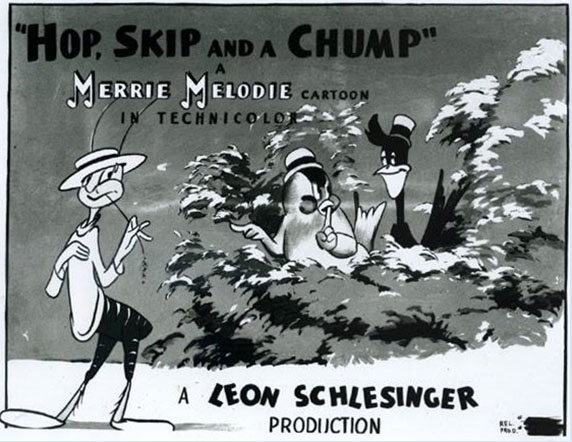
Hop, Skip, and a Chump (1/3/42) – A rural grasshopper, known as Hopalong Casual, demonstrates his skill at evading a bumbling pair of crows, doing a fairly poor impression of Laurel and Hardy. The grasshopper nearly escapes, but is dragged back into the picture through the hole of the iris out. Songs include “Organ Grinders’ Swing”, a number usually associated with the rival Fleischer Popeye episode bearing its title. The tune was widely recorded, including by Ella Fitzgerald with Chick Webb on Decca., the Will Hudson/Eddie DeLange Orchestra on Brunswick, Benny Goodman on Victor, Joe Haymes on Perfect and the dime store labels, Jimmie Lunceford on Decca, Tempo King on Bluebird, Zeke Manners on Variety, Frank Frieba on Columbia, and in Europe by Ambrose on British Decca, Michel Warlop on Swing, Scott Wood and his Six Swingers on British Columbia, and Willie Lewis (a black American band that spent much of its career in Paris) on Pathe. The song received further late revivals by the Four Aces on Decca and Buddy Lucas on Jubilee. Also included are the “Poet and Peasant Overture”, “In a Little Dutch Kindergarten” and the Mercer and Warren “Corn Picking”:
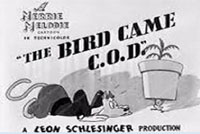 The Bird Came C.O.D. (1/16/42) – Conrad Cat makes his debut in color, as a mishappprone delivery man trying to deliver a potted plant to a theatre. His mannerisms in this appearance suggest a parody of comedian Ben Blue. He encounters the same little tough-guy bird that pestered the two ccurious puppies in “Stage Fright” – only this time for a finale, he has several cousins who gang up on Conrad for the final scene. Songs include “Says Who? Says You, Says I”, and “Over the Waves”.
The Bird Came C.O.D. (1/16/42) – Conrad Cat makes his debut in color, as a mishappprone delivery man trying to deliver a potted plant to a theatre. His mannerisms in this appearance suggest a parody of comedian Ben Blue. He encounters the same little tough-guy bird that pestered the two ccurious puppies in “Stage Fright” – only this time for a finale, he has several cousins who gang up on Conrad for the final scene. Songs include “Says Who? Says You, Says I”, and “Over the Waves”.
Aloha Hooey (1/3/42) – Recently reviewed in “Animation Trails” columns on this site, a contest of one-upsmanship between a seagoing seagull and a country crow over the affections of a saronged island beauty. Songs include “Aloha Oe”, “Sailor’s Hornpipe”, and “Trade Winds”.
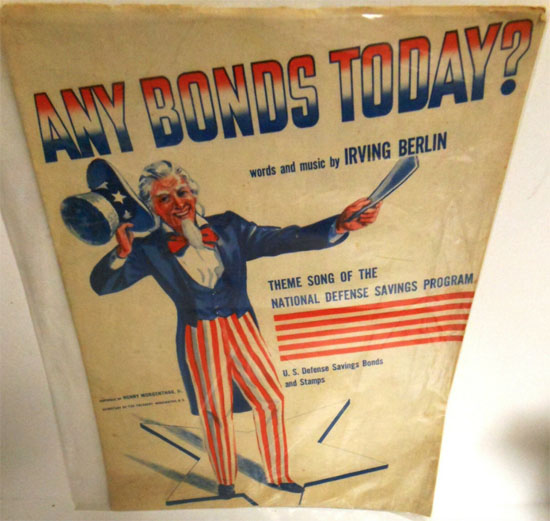
Leon Schlesinger Presents Bugs Bunny (aka “Any Bonds Today”) (release date unknown, but believed to be February 1942) – a special two minute short commercial with Bugs (asisted by Porky and Elmer) promoting war bonds. Although no credits appear, animation can definitely be dated to Bob Clampett, both in Bugs’ model and in use of the “fat” Elmer unique to his films. A blackface scene has Bugs impersonate Al Jolson. Songs include “The Girl I Left Behind Me”, a traditional Revolutionar War march, and Irving Berlin’s “Any Bonds Today?”, a song actually written before the outbreak of hostilities for America, in summer of 1941. It was recorded commercially by the Andrews Sisters for Decca, Kay Kyser for Columbia, singer Barry Wood with the Lyn Murray singers for Victor, and on various airchecks including Gene Autry.
Conrad the Sailor (2/28/42) – So soon, Conrad Cat is back, this time as a yeoman sailor aboard a battleship. He now has the voice of Pinto Colvig, and performs a full verse rendition of “Song of the Marines”. He also has acquired a heckler, in the form of Daffy Duck, returning to Technicolor. Eventually, a wild chase develops between cat, duck, and an artillery shell – with everything coming to a pause to salute the admiral in a running gag.
Crazy Cruise (3/14/42) – Avery’s last spot gag travelogue, with a Bugs Bunny cameo. Musical score includes another early appearance of “Trade Winds” (“Someone’s Rocking My Dreamboat”), another number that would be internalized into the Carl Stalling mindset for many subsequent reuses. The number was heavily recorded, with a hit version by the Ink Spots on Decca (with the ensemble, led by Charlie Fuqua, taking the section of the arrangement usualy reserved for bass-talker Hoppy Jones). A cover vocal was recorded by the Four King Sisters on Bluebird. It was actually introduced by the Four Tones with the Eddie Beal Trio on the “Make Bellieve Ballroom” label – a master that was bought up by Victor for wider release on their Bluebird series. Benny Goodman got it for Okeh, and Erskine Hawkins also performed a dance band version on Bluebird. Orrin Tucker joined in for Columbia, Artie Shaw for Victor, and Woody Herman for Decca. Issy Bonn brought it to England on Rex, also Geraldo on Parlophone, Jay Wilbur on Rex, Eric Winstone and his Accordeon Band on Regal Zonophone, and Vera Lynn on Decca. Another studio outtake disc also exists by the Ink Spots from their guest appearance in Abbott and Costello’s “Pardon My Sarong”. Also appearing again in this film are “The Gaucho Serenade”, “How Dry I Am?” “Mary Had a Little Lamb” and “Swanee River” (The Old Folks At Home).
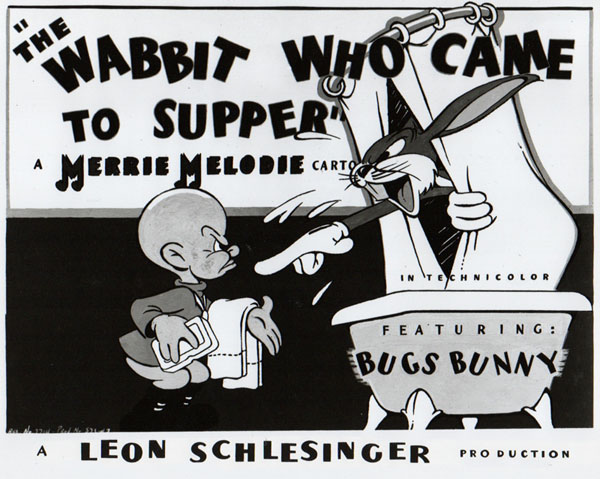
The Wabbit Who Came To Supper (3/28/42). A prospective inheritance puts Elmer on ths spot – no loot if he brings harm to any wabbits. Bugs takes full advantage of the situation, moving in on Elmer lock, stock, and barrel. When Uncle Louie kicks the bucket, the whole inheritance is eaten up by taxes, with Elmer owing “$1.98 – Please remit” And the chase is on again. Songs: “Auld Lang Syne” (as Bugs celebrates New Years in July), “Rock a Bye Baby” (Bugs directing Elmer to “Swing it”), “Long, Long Ago” and a Stalling favorite “Angel In Disguise”.
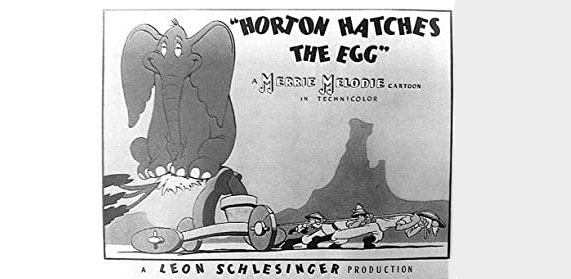
Horton Hatches the Egg (4/11/42) – Previously reviewed in “Happy Henfruit” series on Animation Trails. The signature tune of the piece is a bollixed-up rendition by Horton the elephant of “The Hut-Sut Song”, a novelty hit using words in Swedish (Horton states “I still can’t get the words of that song!”). Freddie Martin had the major hit on Bluebird, with the same label releasing a vocal cersion by the Four King Sisters. Horace Heidt covered it for Columbia, and a vocal appeared on the same label by Ella Logan. Johnny Messner did a dance band version, while the Jesters and the Merry Macs both performed vocals on Decca. The Hoosier Hot Shots performed it on Okeh, as did Frankie Masters. In England, Elsie Carlisle gave it a whirl on Rex, Lew Stone on Decca, Nat Gonella on Columbia, and Harry Roy on Regal Zonophone. Svend Asmussens’ Quintet recorded it in occupied Copenhagen on Odeon, and Stig Holms in Norway on HMV. A late revival appeared by Homer and Hethro in the 1950’s on Victor. Other songs in the cartoon include “Song of the Volga Boatmen”, and “It Looks Like a Big Night Tonight”.
Dog Tired (4/25/42) – Various mishaps for the two curious pippies (again in search of a bone) in a zoo, with a laughing hyena as the running gag to comment on the dogs’ woes. Songs include the usual “Where, Oh Where Has My Little Dog Gone”.
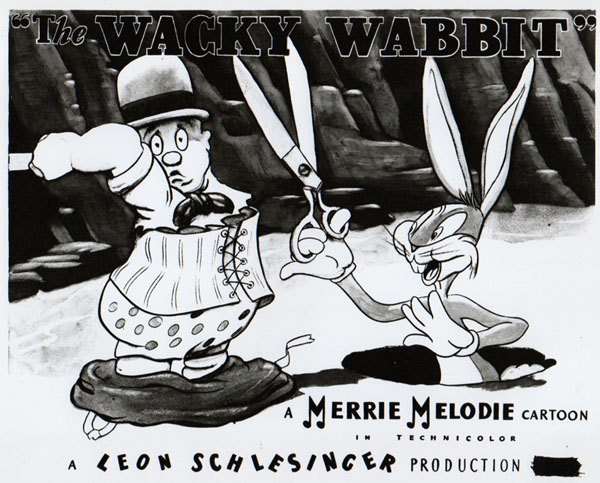
The Wacky Wabbit (5/2/42) – Mischief in prospecting territory for Bugs and Elmer – and the only gold fought over being their respective gold teeth. “Oh Susanna” (with specialty lyrics for the characters’ duet), “I’ve Been Working On the Railroad”, and “Bury Me Not On the Lone Prairie” appear (the latter using a melody line differing from commercial recordings such as Vernon Dalhart’s 1927 recording for Columbia). Various melody beds for this song would appear on later album versions by Johnny Cash on Columbia, Johnny Ray on Columbia, and the Sons of the Pioneers on Victor.
WARNING: The following clip featuring Al Jolson is politically incorrect:
The Draft Horse (5/9/42) – a refugee from the glue factory tries out for the U.S. Army – and washes out in the middle of a sham battle that isnn’t sham enough to suit him. He winds up doing his bit by knitting Bundles for Bluejackets. “We Did It Before and We Can Do It Again”, “Light Cavalry Overture” “William Tell Overture – the Chase”, “It Had To Be You “ (set to another striptease, as the horse removes his saddle), “Columbia, the Gem of the Ocean”, “Song of the Marines, “Taps”, “You’re In the Army Now”, and “The Old Gray Mare” all make appearances.
Lights Fantastic (5/23/42) – No plot, but the Warners’ razz goes to the neon signs on the Great White Way – which had actually been shut off for the duration. Various products get the usual lampoons – like Face and Sunburn (Chase and Sanborn) and Stucco House (Maxwell House) coffees, and a slide show for Egyptian Cigarettes (reworked later in A Hare Grows in Manhattan). Songs include “Lullaby of Broadway”, “Chinatown, My Chinatown”, “My Wild Irish Rose” (written by Chauncey Olcott, whose fictionalized “life story” was portrayed by Dennis Morgan in a 1949 film of the same title – recorded by the author on Columbia, John McCormack on Victrola, Harry MacDonough and the Haydn Quartet on Victor, William Robyn on Cameo, Charles Harrison on Vocalion, Walter Van Brunt on Edison, Robert E. Lennon on Victor, Ernest Davis on Paramount, and achieving the astatus of a standard, with later electrical recordings by Phol Regan on Decca, Jan Garber on Okeh, Justin Ring on Decca, Frank Munn on Brunswick, the Tietge Sisters on Victor, Dennis Day on Victor, Frankie Carle on Columbia, and the Four Tunes on Jubilee, among others), “The Latin Quarter”, and Strauss’s classic “Voices of Spring” (accompanying the most ornate and flowery neon of all, lighting up at last a tiny little sign in the middle in flickering light, reading “Eat at Joes”.) And let’s not forget “Laugh Clown Laugh”:
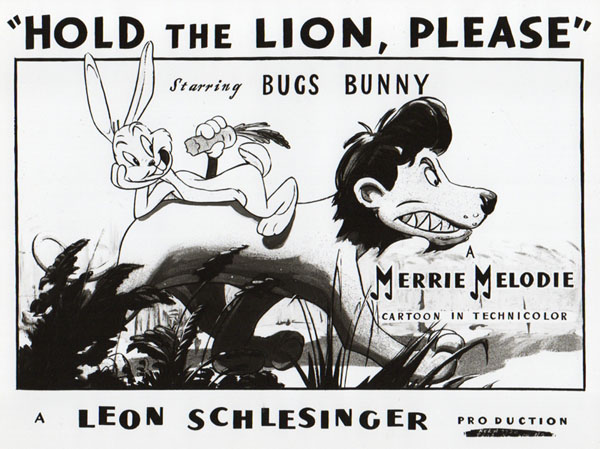
Hold the Lion, Please (6/15/42) – Bugs vs. a washed-up lion, who is trying to prove he’s still king of the beasts instead of a “has-been”. We meet for the only time Mrs. Bugs Bunny, who proves she wears the pants in her family by displaying them. Songs “Always In My Heart”, (an Ernesto Lecuona composition, recorded by Glenn Miller on Bluebird, Kenny Baker on Decca, Jimmy Dorsey on Decca. Jan Savitt on Decca, Carmen Cavallero on Decca, Orrin Tucker for Columbia, and Dick Jurgens on Okeh), “Tain’t No Good” (recorded by Cab Calloway on Okeh, Erskine Hawkins on Bluebird, and a two-sided arrangement on Decca by Jimmy Dorsey), and “When the Swallows Come Back to Capistrano”.
Double Chaser (6/23/42) – Cat chases Mouse, Dog chases Cat. Mouse blows himself to kingdom come with a “bomb” made from a painted apple. Not much else to say, really. Songs include “Chicken Reel”, “Let the Rest of the World Go By” and “The Girlfriend of the Whirling Dervish”.
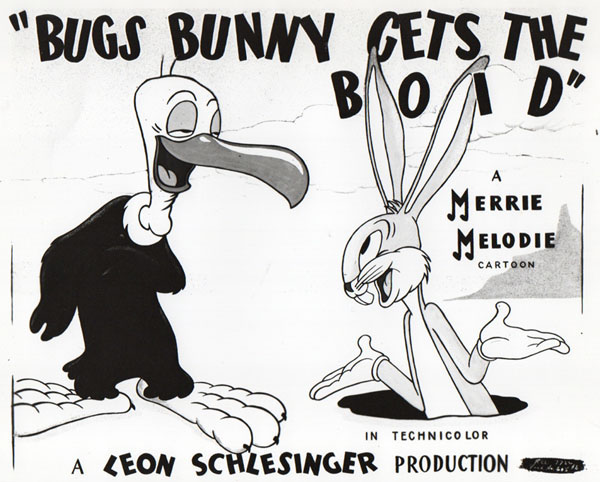
Bugs Bunny Gets the Boid (7/16/42) – The memorable introduction of Beaky Buzzard, known in the studio as the “Snerd Bird”, taking off on Mortimer Snerd from the Edgar Bergen show. His Mama turns out to be quite ethnic in dialect – possibly a cross between Italian and/or Greek. Entire intro of this film would be reused in the sequel, The Bashful Buzzard. And Bugs gets another memorable fake death scene, that seems to even fool him, until he gives us a disclaimer: “Eh, I knew it all the time.” Songs: “Arkansas Traveler”, the NBC chimes, “Over the Waves” and of course “Blues in the Night”.
Foney Fables (8/1/42) – Mother Goose gets another up-to-date spot gag razz, complete with wartime references (the goose lays aluminum instead of golden eggs for the duration, the grasshopper saves for winter with war bonds, and Old Mother Hubbard is discovered to be a food hoarder). “Sing a Song of Six Pence”, “Beautiful Dreamer”. “Mutiny in the Nursery”, “Brahms’ Lullaby”, “We Did It Before (and We Can Do It Again)” and “Heaven Can Wait” round out the musical program.
The Squawkin’ Hawk (8/8/42) – After several dress rehearsals in magician’s hats. Chuck Jones’s little tough bird finally hatches as the full-fledged Henery Hawk. He turns down the worms Mama wants him to eat, favoring chicken instead, and ventures out on his first henhouse raid. He would not reappear for several years, however, until Robert Mckimson’s pairing of the character with Foghorn Leghorn made film history. Songs include “Trade Winds” (below, recorded by Bing Crosby), and “T’ain’t No Good”.
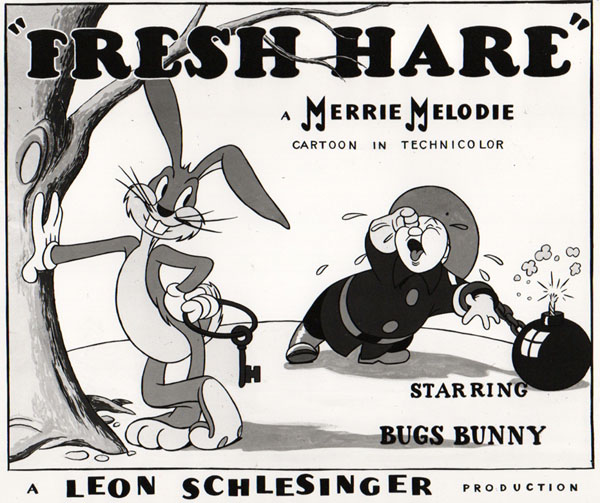
Fresh Hare (8/22/42) – Bugs is pursued by little fat mountie Elmer Fudd for such charges as “running through a boulevard stop” and “conduct unbecoming a wabbit”. A surreal (and often censored) ending turns a firing squad into a minstrel show troupe, fulfilling Bugs last wish – “I Wish I Were in Dixie”. Music includes “Far Into the North” (the default Mountie song from the live-action short Romance Road), “Jingle Bells”, “Dixie”, and “Camptown Races”.
WARNING: Once again, it’s Al Jolson… from the 1939 feature Swanee River:
WARNING: And while we’re at it… here’s that surreal (and often censored) ending:
Next: the 1942-43 Looney Tunes – the last of the black and whites.


 James Parten has overcome a congenital visual disability to be acknowledged as an expert on the early history of recorded sound. He has a Broadcasting Certificate (Radio Option) from Los Angeles Valley College, class of 1999. He has also been a fan of animated cartoons since childhood.
James Parten has overcome a congenital visual disability to be acknowledged as an expert on the early history of recorded sound. He has a Broadcasting Certificate (Radio Option) from Los Angeles Valley College, class of 1999. He has also been a fan of animated cartoons since childhood.











































Old-time country fiddle contests typically require entrants to play a set of three dance tunes: a waltz, a jig, and a reel (or hornpipe). “Over the Waves” is such a familiar waltz tune in this context that I had long assumed it was a traditional American folk tune. So I was surprised to learn that it was written by a Mexican composer and violinist named Juventino Rosas Cardenas. It became a hit in the U.S. after his orchestra played it at the Columbian Exposition in Chicago in 1893. A year later, while on tour in Cuba, Rosas fell ill and died at the age of 26.
In the “Girl Friend of the Whirling Dervish” musical number from “Garden of the Moon” violinist Joe Venuti is seen briefly playing a Stroh violin, with two metal horns but no wooden resonating chamber. Much louder than standard violins, Stroh violins were widely used in the early days of sound recording because their tone could be heard above the texture of a brass band, and because the horns could aim the sound directly at the microphone. I’ve seen them in museums but have never seen anybody play one.
As recording and mic techniques became more sophisticated, Stroh violins quickly fell out of favor as the horn configuration necessarily made the violin tone too harsh, especially for classical recordings. Uncommon now, but people do still play them, and often to good effect. Try here: https://www.youtube.com/watch?v=_ibIpex2tKY
Chuck Jones considered “The Draft Horse” the cartoon where he discovered he could be funny, as opposed to cutesy or arty. Pacing is still a little slow, but the timing on individual gags is sharper and the animators are getting better at exaggerating action. “Conrad the Sailor” and “Hold the Lion, Please” also have their moments. Jones is starting to hone his directorial style, thought he’s not quite there yet.
Mel’s singing Porky in the “Any Bonds Today?” short isn’t sped up fast enough, and as a result sounds like stuttering Bugs. Which likely shows how fast the special short was rushed out the door for the government in the wake of Pearl Harbor.
I was watching a cable shopping channel (not HSN) one afternoon in the early ’90s, and the two hosts were shilling a VHS tape of classic cartoons, talking about how funny it is, and for some odd reason, the scene they decided to show was the closing gag from “Fresh Hare,” minstrels and all. Cut back to the hosts, laughing merrily and continuing their sales pitch.. making me wonder if they had actually watched the clip.
So sad that You would have to put a warning for an AP Jolson performance.
Great post otherwise!
Damn spellchecker, Al
Last year, CBS’ “Sunday Morning” did a story about blackface and they started the segment with the ending of “Fresh Hare” (I wonder how Warners felt about that?).
I think “Fresh Hare” is in public domain.
I much prefer the music from the 30s. Something about a lot of these 40s recordings seems tame, like they have lost all spontaneity and the fun has been drained out. I suspect the war got everyone taking themselves too seriously.
“I suspect the war got everyone taking themselves too seriously.”
Yeah, existential threats tend to do that to people.
For years I’ve been trying to find out the name of the song used in the title music for “Bugs Bunny Gets The Boid”. The song continues as the underscore for the opening scene with the Mama bird and the buzzards. This title is not mentioned in the notes.
The cue sheet for that film says the song is “Honey Bunny Boo” by L. David and Kim Gannon – however, it doesn’t sound like that song to my ears.